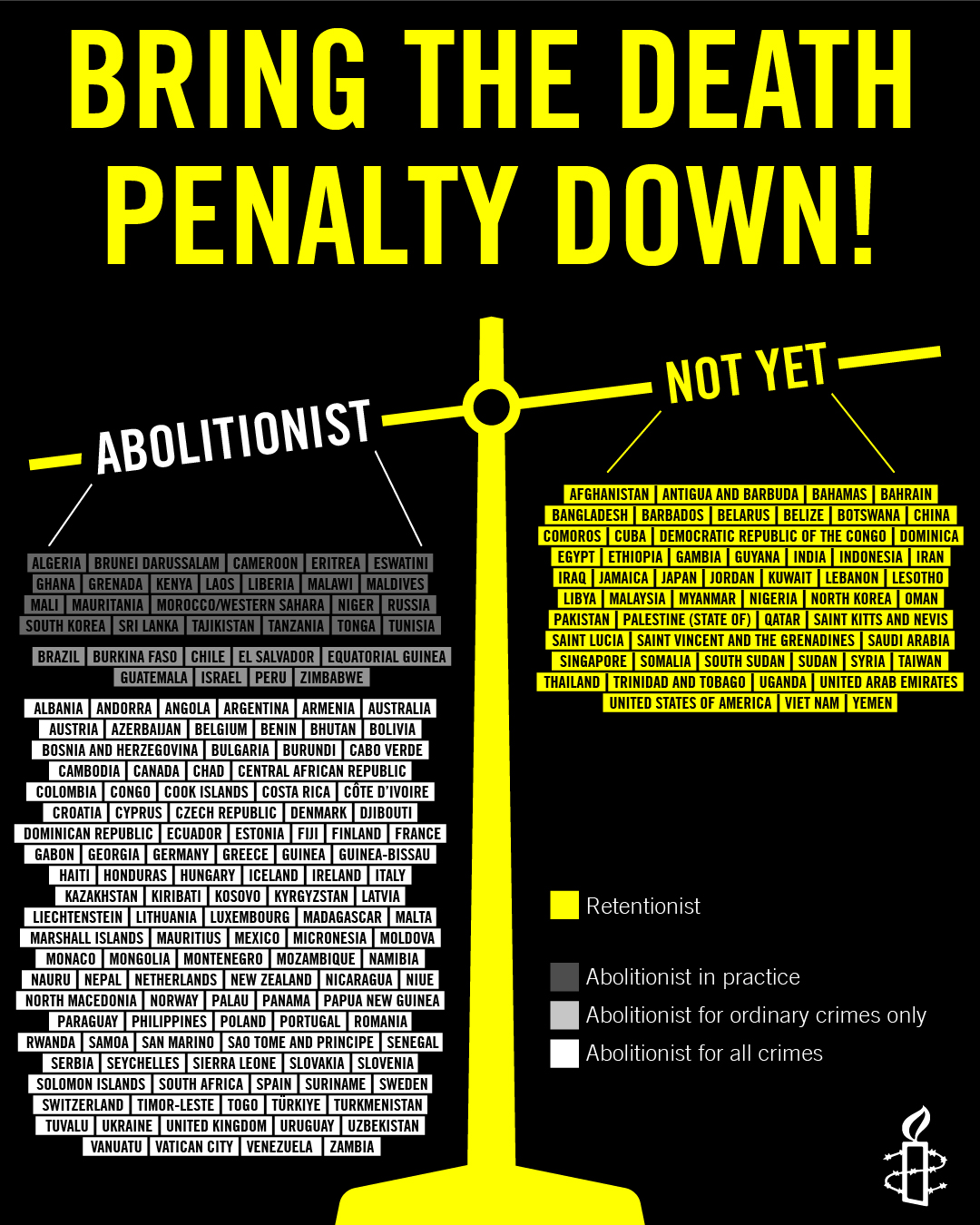Why capital punishment should be abolished?
The death penalty violates human rights. The right to life and the right not to be subject to cruel or inhumane treatment or punishment are fundamental rights enshrined in the United Nations Universal Declaration of Human Rights.
To read more about Canada’s history of capital punishment, visit our summary here: The Death Penalty in Canada.
Amnesty International Global Death Penalty Report
Every year, Amnesty International publishes its annual “Amnesty International Global Report: Death Sentences and Executions.”
- View the 2024 Report: Amnesty International Global Report: Death Sentences and Executions 2024
- View the 2023 Report: Amnesty International Global Report: Death Sentences and Executions 2023
- View the 2022 Report: Amnesty International Global Report: Death Sentences and Executions 2022
- View the 2021 Report: Amnesty International Global Report: Death Sentences and Executions 2021
- View the 2020 Report: Amnesty International Global Report: Death Sentences and Executions 2020
Death penalty facts
In practice, capital punishment regularly violates many other human rights:
- Capital punishment disproportionately affects poor people.
- It disproportionately affects visible minorities and other marginalized groups.
- Death sentences in many parts of the world routinely result from evidence extracted through torture.
- Innocent people have been executed, and nothing short of abolition can guarantee that no innocent person will be executed.
- Capital punishment is often used for crimes or circumstances which international law or standards say should not have a death penalty, such as against those who were under the age of 18 at the time of the offence, following an unfair trial and for non-lethal crimes such as drug trafficking or political offences.
Furthermore, study after study has shown the death penalty is:
- Ineffective at deterring crime
- Extremely costly, draining resources that could more effectively be used to solve and prevent crime
Every year, executions take place in several countries. Regularly, countries such as China, Saudi Arabia, Iraq, Iran and the United States feature as countries with the highest number of executions worldwide.
What countries have the death penalty?
Global executions hit their highest figure since 2015, as over 1,500 people were executed across 15 countries in 2024, said Amnesty International today as it released its annual report on the global use of the death penalty.
According to the report, Death Sentences and Executions 2024, 1,518 executions were recorded in 2024 – the highest number since 2015 (at least 1,634) – with the majority in the Middle East. However, for the second year in a row, countries carrying out executions remained at the lowest point on record.
The known totals do not include the thousands of people believed to have been executed in China, which remains the world’s lead executioner, as well as North Korea and Viet Nam which are also believed to resort to the death penalty extensively. Ongoing crises in Palestine (State of) and Syria meant that Amnesty International could not confirm a figure.
Iran, Iraq and Saudi Arabia were responsible for the overall rise in known executions. In total, the trio accounted for a staggering 1,380 recorded executions. Iraq almost quadrupled its executions (from at least 16 to at least 63) and Saudi Arabia doubled its yearly total (from 172 to at least 345), while Iran executed 119 more individuals than last year (from at least 853 to at least 972) – accounting for 64% of all known executions.
List of abolitionist vs countries with capital punishment
China remains the world’s leading executioner – but the true extent of its use of the death penalty is unknown. Capital punishment data in China is classified as a state secret. Our global figures for executions and death sentences in China exclude the thousands of people that Amnesty International believes to have been sentenced to death and executed.

Death penalty laws: the trend towards abolition
There is a reason for hope. Each year, more countries abolish the death penalty in law or practice. Several UN General Assembly motions have been passed in recent years calling for a universal moratorium on executions with a view to abolition. Far more countries have abolished capital punishment than practice it; each year, executions only occur in a few countries.

Stay informed and take action!
For more updates and additional resources on our death penalty work, subscribe for free to our SubStack newsletter or on BlueSky @dpacoordinator-aic.bsky.social. Contact via email: DPACoordinator@amnesty.ca.











